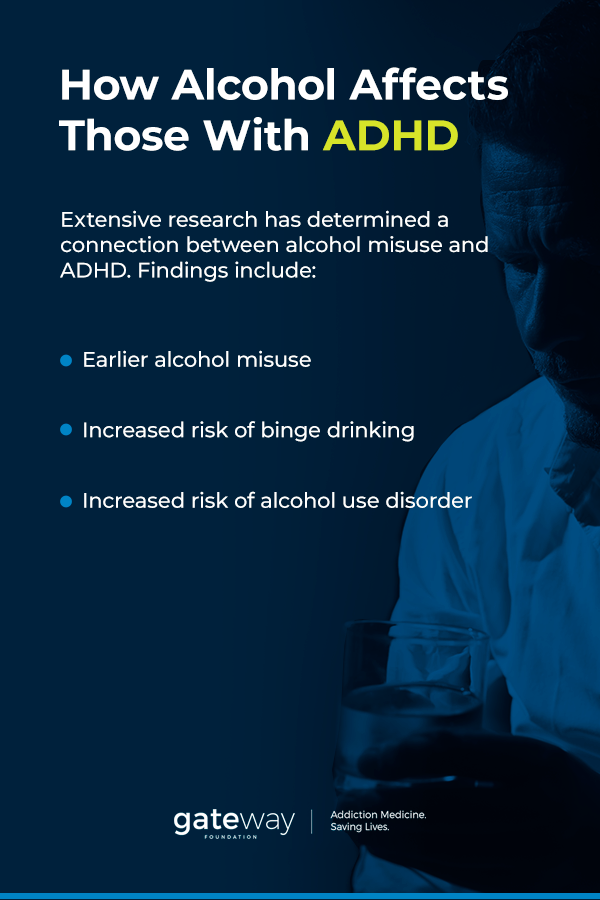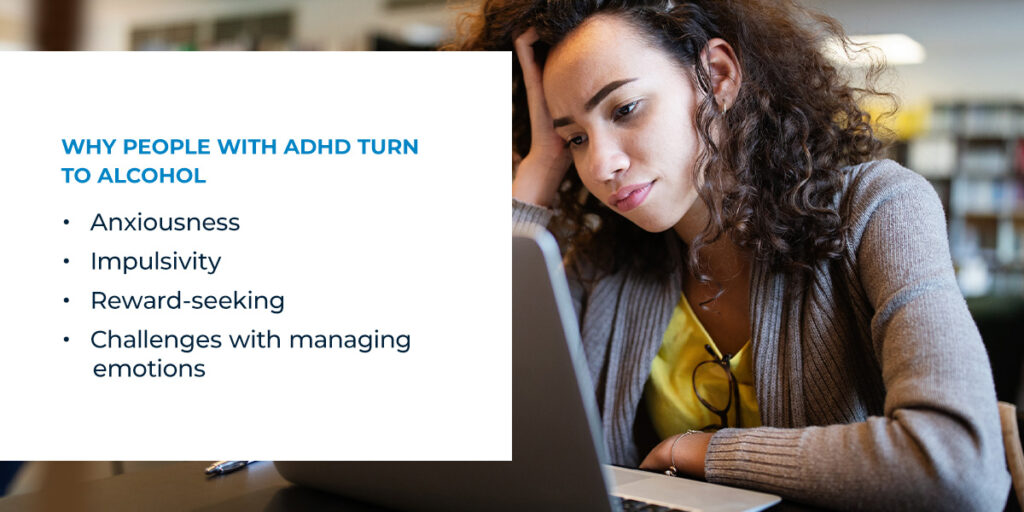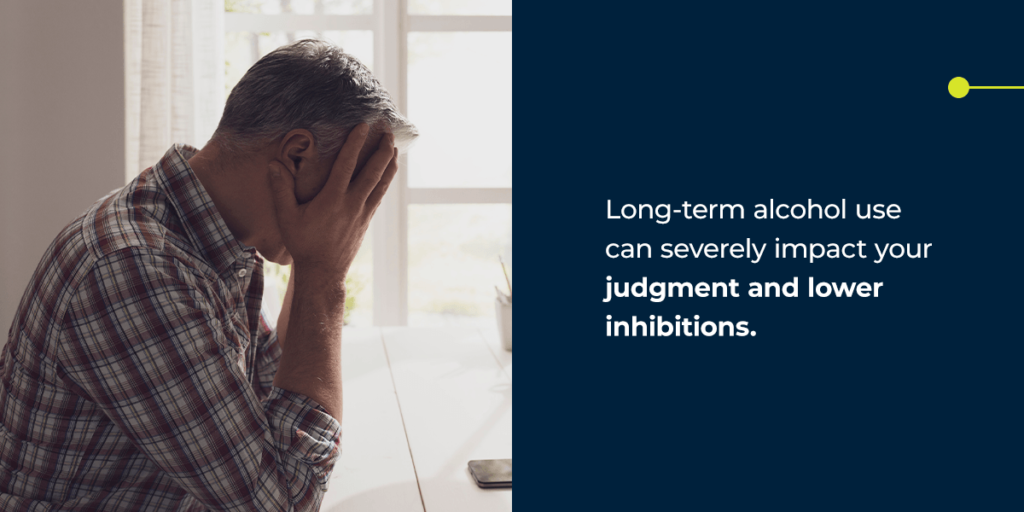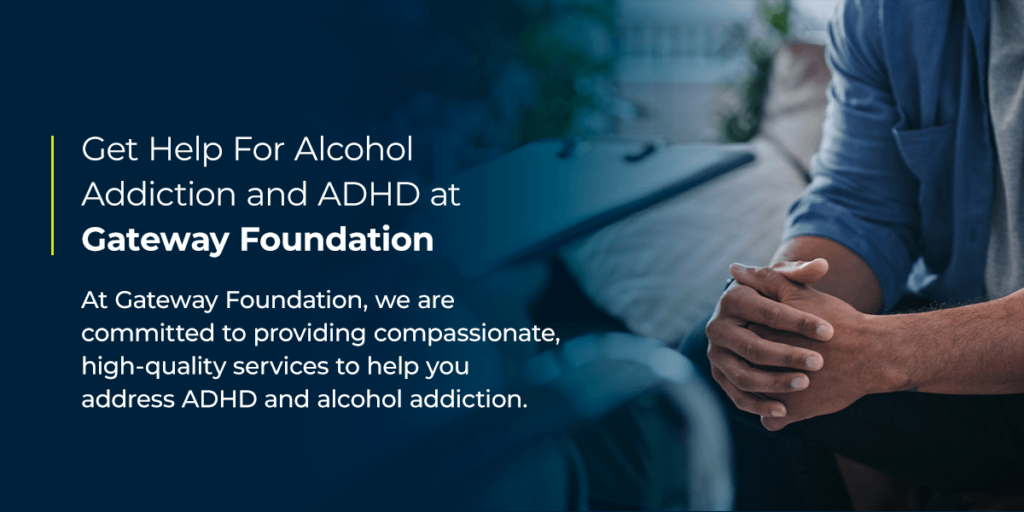- Jun 29
- Alcohol Addiction Treatment
Growing research has supported the link between attention-deficit/hyperactivity disorder (ADHD) and substance use disorder. Causes might come down to shared similarities between drug or alcohol addiction and ADHD symptoms.
While substance use disorder is complex and chronic, it is treatable. Those who enter an addiction center should address their ADHD and alcohol addiction simultaneously to help treatment be effective. Learn about the connection between these disorders and how to get help if you or a loved one is struggling.
What Is ADHD?
ADHD is a neurodevelopmental disorder affecting attention and activity. It’s estimated that 11% of children and 4% of adults have ADHD. Many of its symptoms are common to young children in particular, such as high activity levels, limited attention spans and the inability to sit still for long periods.
A diagnosis of ADHD can disrupt a person’s way of life and cause low self-esteem, relationship troubles or career and academic difficulties. The following symptoms characterize ADHD:
- Inattention: Inattentiveness can make it difficult for those with ADHD to focus on school, work or other essential life obligations. They may make mistakes at school or work, forget necessary appointments and be unable to follow through on tasks requiring sustained mental effort.
- Hyperactivity: This symptom can cause a person with ADHD to fidget, tap their hands or feet or squirm in their seat at school or work. Children with ADHD may run and climb around where it’s not appropriate.
- Impulsivity: People with ADHD may find it challenging to remain patient. They can often make hasty decisions without thinking about the results or interrupt conversations.
Researchers aren’t entirely sure about the cause of ADHD, though risk factors can occur in the womb, such as the parent drinking while pregnant or extreme stress during pregnancy.
ADHD was once believed to only be a childhood disorder, but research has expanded into new areas, such as the link between ADHD and alcohol use in adulthood.

How Alcohol Affects Those With ADHD
Even without a diagnosis of ADHD, the presence of ADHD symptoms can increase the risk for problems related to alcohol consumption.
It seems that having ADHD can also increase your chance of developing alcohol use disorder. Extensive research has determined a connection between alcohol use and ADHD. Findings include:
- Earlier alcohol use: A twin study discovered those with severe childhood ADHD are more likely to drink at a young age and partake in heavy, frequent alcohol consumption.
- Increased risk of binge drinking: Binge drinking is a pattern of drinking where a man has five or more drinks within two hours or a woman has four within two hours. Experts have discovered that individuals with ADHD are at higher risk of binge drinking in early adulthood. One study found that 42.1% of those with ADHD reported binge drinking every time they drank alcohol.
- Increased risk of alcohol use disorder: Studies show that having ADHD in childhood increases the risk of developing alcohol use disorder in adulthood.
While alcohol may appear as a short-term solution to restlessness and anxiety often associated with ADHD, heavy consumption can intensify symptoms of ADHD and render some ADHD medications ineffective.
Learn about the interactions alcohol has on those with ADHD symptoms and those taking ADHD medication:
Consuming Alcohol With ADHD
Though alcohol is a depressant, for those with ADHD, it can have the opposite effect. When a person drinks alcohol, it affects their frontal lobe, which is responsible for clear thinking and decision-making. Individuals with ADHD may engage in impulsive behavior that can lead to harmful consequences. When they consume alcohol, these symptoms can increase. Alcohol can also intensify symptoms of inattentiveness and restlessness.
With prolonged heavy drinking, those with ADHD may experience intensified anxiety symptoms and have difficulty managing their emotions.
Alcohol and ADHD medication
Those with ADHD may be prescribed medications to manage their symptoms, such as stimulants and non-stimulants. Alcohol may interact with the medicine, depending on the type you take.
Stimulants like Adderall are commonly prescribed for ADHD. These medications work by increasing central nervous system activity to counteract symptoms of ADHD. On the other hand, alcohol depresses the central nervous system. By consuming it while taking ADHD medication, it can change how the medication is processed in the brain and cause side effects such as:
- Increased blood pressure
- Increased or irregular heart rate
- Dehydration
- Impaired judgment
- Nausea
- Vomiting
- Raised body temperature
- Trouble sleeping
- Seizures
Combining alcohol and stimulant medications can increase the risk of alcohol poisoning and overdose. Taking these substances for prolonged periods increases your risk of a heart attack or stroke. And since ADHD medications tend to reduce appetite, drinking on an empty stomach while taking these medications can make you drunker faster.
As for non-stimulant ADHD medications and alcohol, the interaction is generally less severe, though it’s advised to never combine medication and alcohol. Depending on whether you have pre-existing conditions or if your medicine is short- or long-acting, you can put your body at risk of dangerous side effects when combining these substances.
Why People With ADHD Turn to Alcohol
Several reasons can cause a person with ADHD to turn to alcohol and develop dependence. The connection between alcohol addiction and ADHD might come down to their shared symptoms, such as:
- Anxiousness
- Impulsivity
- Reward-seeking
- Challenges with managing emotions
These factors can increase the chance of those with ADHD developing addictive behaviors. Since alcohol is a depressant and ADHD can cause hyperactivity, many may use this substance to self-treat their symptoms. Because impulsivity is another symptom of ADHD, this trait can make individuals with ADHD more susceptible to alcohol use.
People with ADHD may self-medicate with alcohol to ease the distress that comes with this condition. They may turn to substances to help them deal with the stress accompanied by social and academic problems. Some people with ADHD may have trouble avoiding alcohol or binge drinking due to impulsiveness. Others might believe alcohol can quell their restlessness and calm them down.
Because those with ADHD tend to seek rewards, they may also turn to alcohol for its initial feel-good effects. When a person drinks alcohol, their body produces extra dopamine, which affects the reward centers in our brain. As a result, alcohol effects can feel initially rewarding for those with ADHD and lead to addiction.
Lastly, both ADHD and alcohol addiction may be genetic. Researchers have also discovered common genes shared between ADHD and alcohol addiction.

Short- and Long-Term Effects of Self-Medicating With Alcohol
Many might use alcohol as a short-term solution to managing their ADHD without realizing the detrimental effects alcohol has on their mental and physical health and ADHD symptoms. The short- and long-term impacts of self-treating ADHD with alcohol include:
Short-Term Effects
Alcohol depresses your central nervous system. In some people, the initial effects may feel like increased energy. However, as you continue drinking, you’ll become drowsy and have less control over your actions.
The short-term effects of alcohol will depend on how much a person consumes, though generally, people might experience:
- Decreased perception and coordination
- Slurred speech
- Drowsiness
- Vomiting
- Impaired judgment
- Diarrhea
- Distorted vision and hearing
- Headaches
- Breathing difficulties
- Unconsciousness
- Blackouts or memory lapses
Excessive drinking can affect your muscle coordination and vital centers in your brain. Binge drinking can even result in a life-threatening coma or death, which is also a concern if you’re taking medications that depress the central nervous system.
Alcohol is also known to increase some symptoms of ADHD, including inattentiveness, impulsivity and lack of proper decision-making. Additionally, there could be a link between insomnia, those with ADHD and alcohol consumption. Insomnia causes difficulty falling asleep or staying asleep. Alcohol can disrupt sleep patterns and therefore exacerbate insomnia in those who also struggle with ADHD.
Though alcohol may seem like a way to cope with ADHD, long-term alcohol use can cause memory, cognition, decision-making and speech difficulties. Alcohol consumption can also cause interactions with ADHD medication, such as:
- Impaired judgment
- Inability to know when you’re getting drunk
- Alcohol poisoning, which can be life-threatening
- Nausea and vomiting
- Anxiety and depression
- Rapid or irregular heartbeat
Long-Term Effects
The long-term impacts of alcohol use and ADHD span from developing alcohol addiction to health and safety risks:
1. Alcohol Use Disorder
Studies show that 43% of people with ADHD are at risk of developing alcohol use disorder.
Alcohol use disorder is a pattern of alcohol use that makes it challenging to control drinking. Those who struggle with alcohol addiction tend to continue drinking even when it causes significant problems. Alcohol use disorder can result in binge drinking, posing several health and safety risks.
ADHD can also present unique challenges for a person attempting to quit drinking, making it essential that you seek help for both conditions.
2. Safety Risks
Long-term alcohol use can severely impact your judgment and lower inhibitions. This can cause a person to make poor decisions and become involved in dangerous situations such as:
- Car accidents and other accidental injuries, such as drowning
- Relationship problems
- Poor work or academic performance
- Increased likelihood of becoming the victim of a crime
- Legal troubles
- Issues with employment or finances
- Problems with other substance use
- Increased risk of suicide

3. Health Concerns
Binge drinking or long-term alcohol consumption can also cause significant health problems, such as:
- Liver disease
- Digestive problems
- Diabetes complications
- Eye problems
- Heart conditions
- Sexual dysfunction
- Congenital disabilities
- Neurological complications
- Weakened immune system
- Bone damage
- Increased risk of cancer
- Medication and alcohol interactions
How to Get Help With Alcoholism
If your pattern of drinking causes distress and functional problems in your daily life, you likely have alcohol use disorder. Alcohol addiction can be mild, moderate or severe depending on the number of symptoms you experience. Signs and symptoms include:
- Being unable to limit the amount of alcohol you consume
- Wanting to cut down on the amount of alcohol you drink and being unable to do so
- Spending most of your time drinking, obtaining alcohol or recovering from alcohol use
- Intense cravings and urges to drink alcohol
- Failing to meet work, school or home obligations due to repeated alcohol use
- Continuing to drink even when it causes physical health, social, work or relationship problems
- Giving up on previously-enjoyed hobbies in favor of drinking alcohol
- Using alcohol in unsafe situations, such as while driving or swimming
- Needing more alcohol to feel its effects
- Experiencing withdrawal symptoms such as nausea, shaking or sweating when you stop drinking
- Drinking to avoid withdrawal symptoms
Alcohol addiction recovery for people with ADHD must include treatment that addresses both conditions. Individuals with co-occurring disorders can have a higher chance of a successful recovery when their mental health conditions are treated alongside drug use, and ADHD is no exception.
If left untreated, the effects of ADHD and alcohol use can worsen over time. Withdrawal can also be fatal or cause relapse. That’s why your conditions must be addressed both medically and professionally under the supervision of health professionals.
The first step for addressing alcohol use disorder is detox and withdrawal. Physicians will perform a medical evaluation to determine the best course of action to taper your body from alcohol. They’ll often use medicines to prevent or alleviate symptoms of withdrawal. Next, they’ll recommend several treatments to help you stop drinking and manage your symptoms of ADHD.
Options for treating alcohol use disorder and ADHD include:
- Cognitive-behavioral therapy (CBT): CBT is an effective therapeutic method for treating addiction and co-occurring disorders like ADHD. Therapists help you pinpoint the stressors that might cause binge drinking, for instance. They’ll work with you to develop ways to improve productivity and confidence issues associated with ADHD.
- Group therapy: Group therapy is an excellent way to find emotional support from others struggling with substance use disorder. You’ll have the opportunity to share your story and learn from others in a judgment-free space.
- Inpatient treatment: Residential or live-in treatment facilities provide 24/7 support and supervision to help you stay sober. Inpatient programs are tailored to meet your needs and often include individual and group counseling sessions.
- Outpatient treatment: Most outpatient programs allow you to live at home while attending therapy or group counseling at a clinic. Outpatient care is less intensive since you only meet on specific days and times of the week.
- Prescription medicines: While attending individual or group therapy, you may take medications that help manage withdrawal and ADHD symptoms.
It’s essential to discuss the above options with a medical professional to find the appropriate treatment for your ADHD and alcohol use disorder.
Get Help For Alcohol Addiction and ADHD at Gateway Foundation
ADHD and alcohol use disorder can feel defeating and isolating. If you or a loved one is struggling with these conditions, please know that you are not alone.
At Gateway Foundation, we are committed to providing compassionate, high-quality services to help you address ADHD and alcohol addiction. Appreciate a personalized care program to help you live a healthy, productive and sober life.
To learn more about our programs, get in touch with us today.



